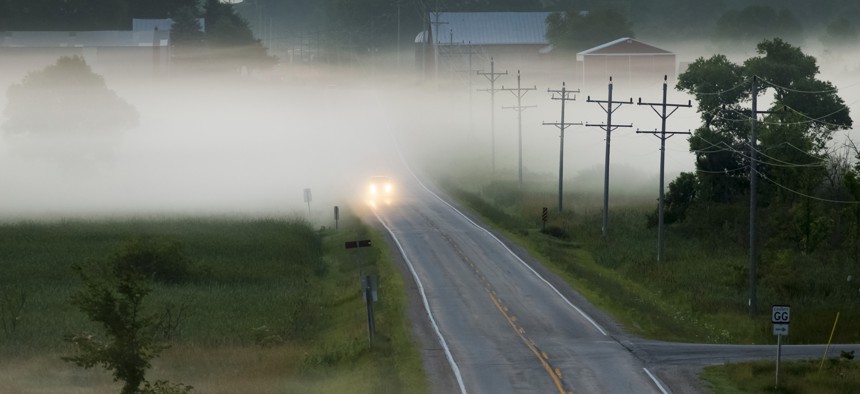Biden Administration Plays Up Billions for Rural Infrastructure

A car drives along a road, in morning fog, in Wisconsin. Getty Images/ Mike Roemer / Aurora Photos
The White House released new information this week for places looking to access the cash and officials said to expect over $2 billion in funding announcements for rural areas this month.
The Biden administration this week launched a special push around rural investments under the bipartisan infrastructure law, releasing a new guidebook and other materials meant to help rural communities tap the funds, and dispatching officials to promote millions of dollars for rural projects spread out around the country.
Surely, the White House is trying to build hype for one of the president's signature achievements so far in office, during what is expected to be a tough election year for Democrats. But the administration's rural infrastructure campaign is also a reminder that the law, which Biden signed about five months ago, does have a significant amount of money in it for areas outside of cities.
"The fact that rural communities have been under recognized and under resourced for years is something that we can and must do something about," Transportation Secretary Pete Buttigieg said Wednesday during an event in Tell City, Indiana, highlighting a $1.6 million grant there to make improvements at a port on the Ohio River.
Biden's infrastructure czar Mitch Landrieu, the former New Orleans mayor, noted on a press call this week that there is $14.6 billion in the package that specifically targets rural areas and that this funding is on top of billions more set aside for rural communities in some of the Department of Transportation's biggest programs.
The Transportation Department says it will direct more than $44 billion over the next five years to rural communities through the law.
Expanding affordable, high speed internet access in rural areas was a top priority Landrieu listed in his remarks. The law includes $65 billion for broadband programs. Agriculture Secretary Tom Vilsack said that USDA recently put out a call for applications for $1.15 billion in funding to expand rural broadband access and received about 300 applications totaling over $4.8 billion.
"There's great demand," he added.
Landrieu mentioned upgrades to water and sewer systems, bridges, transit, locks, dams and the electric grid as some of the other key areas in rural regions that are primed for spending under the new law.
In April alone, he said that the administration plans to announce over $2 billion of rural infrastructure funding. He also said that there are over 100 programs open to rural jurisdictions that don't necessarily require a local funding match to secure available federal money.
'That Sends a Message'
Buttigieg, in Tell City, tried to draw a link between infrastructure investments and local economic health, pointing to how the port project there would help a local foundry that uses deliveries of crude iron to make products like brake rotors and other vehicle parts.
He also made a case that infrastructure upgrades could help with another issue—younger people moving away from the rural areas where they grew up.
"If a young person looks around their community and they see degraded infrastructure, they see that the bridges are out, they see that the roads aren't in good shape," Buttigieg said, "that sends a message about investment in the community that makes them question whether they should invest their future in where they came from."
That said, many rural counties are up against difficult demographic realities, with poverty rates often outpacing nonrural areas, especially in the South, and with dozens of counties, in regions like the northern Great Plains, seeing populations decline and their remaining residents grow older. How far a wave of public works spending can go towards reversing these longstanding trends remains to be seen.
Likewise, whether the infrastructure spending will afford Biden and his party much goodwill in rural areas is an open question. Many rural regions are Republican strongholds. For instance, in Perry County, where Tell City is located, Biden won just 36% of the vote in 2020. And concerns about inflation and elevated gas prices are running high.
In Congress, GOP lawmakers will no doubt be closely watching to see how infrastructure grant funding is divvied up and whether rural communities are getting their fair share compared to cities with more Democratic voters.
Buttigieg said his department has been "putting our money where our mouth is" with rural spending even before the infrastructure package. He cited nearly $1 billion in grants awarded last year under what's known as the INFRA program as an example, saying the Transportation Department awarded 44% to rural projects, instead of the minimum required threshold of 25%.
Investments like those under the new law, he added, "can be unifying in a very, very divided time."
Bill Lucia is executive editor for Route Fifty and is based in Olympia, Washington.
NEXT STORY: On Streets With Pavement Art, Study Finds Drop in Crashes






